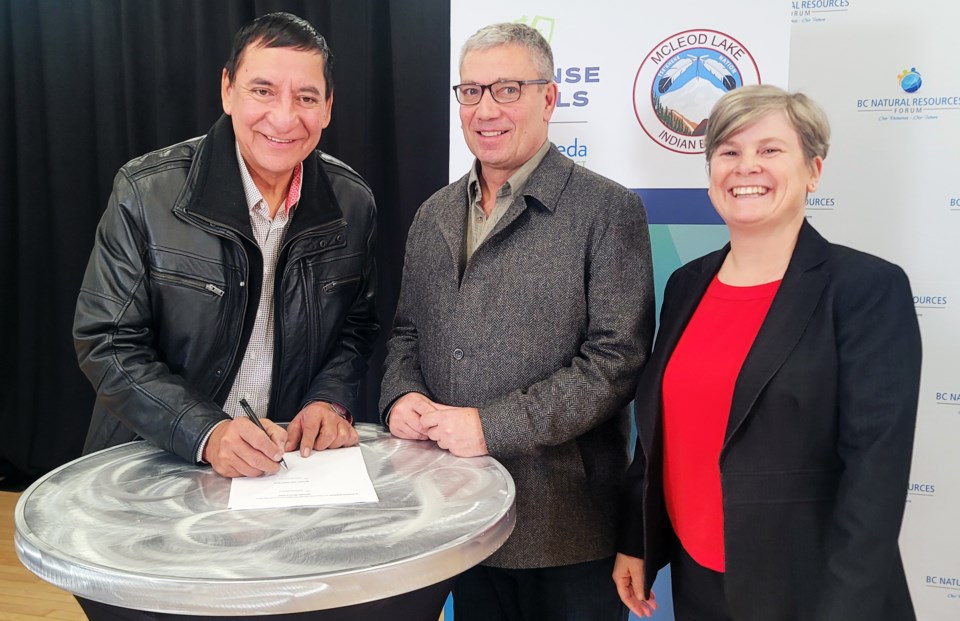An equity partnership and co-design agreement between the McLeod Lake Indian Band and Defense Metals of Vancouver to create a rare earth elements mine north of Prince George was announced Wednesday at the BC Natural Resources Forum.
The mine, which would extract neodymium and praseodymium, magnetic metals used in cell phones, air conditioners and maglev trains, is projected to produce 10 per cent of the global supply once it becomes fully operational.
It would be the first of its kind in Canada.
“it’s significant that McLeod Lake will now be a true partner in making decisions throughout the process,” said Defense Metals CEO Craig Taylor.
“Neodynium and praseodymium are instrumental in the manufacture of light-weight magnets that are in all of our day-to-day devices, cell phones, electric vehicles, electric seats in your car, wind turbines, military components, air conditioning, refrigeration.
“Right now the industry is dominated by China. They have 80 per cent of production and there’s a real threat to the West that if they were to cut off that production or just absorb all of their production internally, we’d be left without these modern conveniences we’ve come to rely upon.”
The mine, 35 kilometres east of Bear Lake, would be the first of its kind in Canada.
Taylor estimates the construction phase would create 400 jobs and operations would require 200 full-time employees. Depending on the permitting process, the company is hopeful construction will begin in four-six years.
Construction cost is estimated at US$300 million.
Taylor says the metals are close to the surface and can be easily extracted. The mine site sits along the 700 logging road and is close to hydro transmission lines, railway and highways and is only about 400 kilometres away from the port in Prince Rupert. There’s also a skilled work force to draw from in Prince George, 115 km to the south.
The Wicheeda Project is generating interest in South Korea, Japan, Europe, Australia, and the United States from companies looking to fill their processing needs. Capable of annually producing 25,000 tonnes of rare earth oxide, the product would initially be sent to China for further processing. The Wicheeda deposit is enough to supply three processing facilities.
“The Chinese really latched on to it decades ago and they said rare earths are to China what oil is to Saudi Arabia, so they’ve taken that and run with it,” said Taylor. “We’re looking for help and I think the Western world has woken up to that fact and they’re starting to support projects like this.”
The McLeod Lake band purchased 2.6 million common shares in Defense Metals as its commitment to the project.
“It’s a true form of economic reconciliation for our people because we’re involved in the project every step of the way,” said McLeod Lake chief Harley Chingee. “We’re glad to be part of this and hopefully we can get a bigger stake as we go forward.”
The project has been in the works for six years and is now in the exploratory and planning stage, which means more research, environmental assessments and social and technical evaluations will be required to determine mine feasibility and its potential outcome.
B.C. Minister of Mines, Energy and Low Carbon Innovation Joan Osborne said the project perfectly aligns with Canada’s Critical Minerals Strategy and its development will leave a low-carbon footprint will help the province achieve a sustainable net-zero emissions future.
“B.C. is home to 16 of the 31 critical minerals identified in Canada’s Critical Minerals Strategy and pretty much everything you touch has a connection to this industry,” said Osborne. “More and more as we drive electric vehicles or take electric busses, as we see wind turbines, as we put solar panels on our homes, we’re part of this energy transition.
“We know we’ve got the minerals here in B.C. and we’ve got a generational opportunity to seize and develop this in a way that helps protect the environment and contributes to climate action goals and does so in partnership with communities and First Nations and creates really good-paying jobs.”




